Notes from the Capital: News from Our 2018 Kinder Scholars
Each year, a cohort of 20-plus MU undergrads makes the trek eastward to the capital in early June to take part in the Kinder Institute’s annual Kinder Scholars D.C. Summer Program. Through the program, they spend the next two months interning at various sites throughout Washington, reading and discussing materials for the co-taught “Beltway History & Politics” seminar, and exploring the city and surrounding areas on their own and through the seminar’s embedded field trip component.
And somehow, amidst all of this, they find time to send word back to Columbia about what responsibilities they’ve taken on, what sites they’ve taken in, and what subject matter has especially piqued their interest in the classroom. Without further ado, here is a compilation of Rounds 1 and 2 of our yearly “Notes from the Capital” update series, for which Rylie White (Biochemistry & Political Science), Jennifer Sutterer (Political Science & Philosophy), Anna Jaoudi (Political Science), Grace Hodson (Public Health), Sarah Jolley (English, Political Science, History), and Mackenzie Elliott (Strategic Communications) supplied the news. Note that some answers have been excerpted and slightly edited for length, and that responses came in at varying points during the first two weeks of the program.
Notes from the Capital
KICD: How was the first week (or two, or three weeks) of work? Responsibility-wise, is there anything about the internship that’s surprised you so far and/or anything that you’re particularly excited to do more with?
JS: I am interning with Senator Roy Blunt, and in a few weeks, I will be with Congresswoman Ann Wagner’s office! I am excited to hopefully attend a few committee meetings with Senator Blunt, given that he is on many interesting ones, like the Senate Select Committee on Intelligence, and I have enjoyed giving constituent tours because I’ve learned so many interesting facts about the Capitol. And I have been fortunate to see some famous faces while on tours, including when Speaker Paul Ryan walked right in front of me and we made eye contact—an EXTREMELY exciting moment for me!
GH: I am doing research with the Psychology Department at George Washington University on how intersectionality impacts HIV/AIDS patients. I was given hundreds of pages of previous research to examine for my first week and took advantage of many public spaces to read. I’ve sat on a blanket under a tree on the mall, by the fountain in the sculpture garden, and today it’s raining, so I’m typing this response in the main reading room of the Library of Congress.
SJ: This summer I’m interning at the Center for International Policy, a nonprofit research organization dedicated to promoting transparent, accountable foreign policy. I work on two different programs: the Arms & Security Project, and the Foreign Influence Transparency Initiative. I’m currently researching trends in U.S. military aid to Egypt over the past decade and creating a database to compare foreign lobbying efforts with U.S. arm sales. I initially applied for my internship with the Arms & Security Project in mind, but I’ve been pleasantly surprised by how much fun I’m having with the Foreign Influence Transparency Initiative. I’m excited to continue educating the public about what lobbyists are doing on behalf of foreign governments and corporations. (Click here for an article that Sarah recently published as a result of research conducted at the Center for International Policy).
AJ: I’ve been at the Child Welfare League of America for almost three weeks now, and I’m loving it! It’s located right behind the White House in central Washington D.C., and I am here for the summer as a Practice Standards Intern, doing research on evidence-based policies and practices in child welfare services across the country. I’m excited to learn more about the field and to continue to make an impact on children and their families.
RW: I am interning in the science and technology department at the Potomac Institute for Policy Studies, which is a think tank and nonprofit that focuses on national security. At the end of my internship, I’ll be required to write a 5-page research paper containing a policy recommendation and to give a presentation on an issue related to science and technology. At this time, I believe my research topic will focus on how hypersonic weapons development could affect national security and nuclear deterrence theory.
ME: Right now, I am a communications and marketing intern for Girls Inc. of the Washington, D.C. Metro Area. I had come with the idea that I would be doing simple tasks from day to day, but the amount of work I have been given has genuinely surprised me. I love that I feel needed at my job and that I am making a difference in the non-profit world. I firmly believe in the idea of Girls Inc. and am so eager that I get to help with their mission hands on and know that what I am doing is valued by my staff. I have had so much fun learning how to build a strategic plan for this company and am in the process of rebuilding their website (girlsincdc.org).This place has been incredible and my role has solidified for me that I am meant to have a career in advertising.
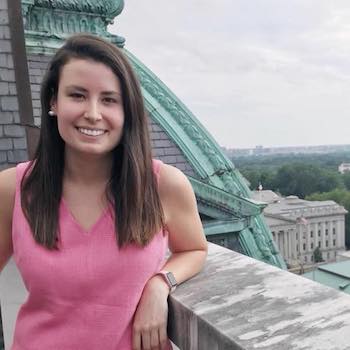
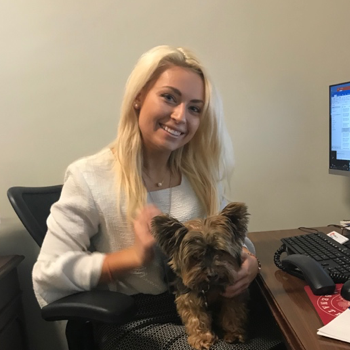
(L: Anna Jaoudi’s view from work; R: Jennifer Sutterer and Sen. Blunt’s dog, Max)
KICD: I know it’s only been a week or two, but any highlights from the seminar yet? Looking down the syllabus, what’s something that you’ve already looked at/read about/discussed that you’re hoping will come up again in some form in a later class session?
AJ: Being able to live in the same city we are learning about is really impactful. As far as class discussion goes, I took an Immigration and Urban Politics class last semester and learned a lot about gentrification, poverty, and changing cities, and so I’m hoping we talk more about these issues in relation to how D.C. is changing demographically
JS: Although we have only met a couple times, my favorite part of this experience has been the Kinder program. Not only are my fellow students amazing, but I have found the readings, classes, and field trips to be invigorating. I very much enjoyed reading about and visiting the CIA—so much that I am considering giving up law school to apply for an intelligence agency. And I hope the intricate balance between covert action for national security and transparency for democratic values comes back up in another class. It is such an interesting debate that applies to more than just intelligence agencies, and I feel that we have only just scratched the surface of it.
RW: I particularly liked Dr. Selin’s reading, which focused on the unification and centralization of intelligence agencies following the 9/11 attacks, for how it analyzed the dynamic between intelligence agencies and gave me a better idea of the ways in which their dependence on and coordination with one another may shift in response to tragedy or presidential administration changes.
GH: With Dr. Conklin, as we discussed the planning of D.C., I was able to contribute a bit of my public health knowledge to the conversation. The founders of the city wished for there not to be any spring or water source privately owned in Washington, and that they all be opened to the public. I was able to point out that no matter if supply was available to the public, a private ownership would put everything downstream at risk for contamination, over-use, etc., a public health issue that caused quite a feud between Chicago and Saint Louis in the early 20th century. I guess my main wish is that I can continue to help my fellow Scholars understand that public health is all around them, and I think that we’ll be able to touch on this quite a bit while discussing agencies and economic equality.
ME: The field trips have been fascinating, but I would have to say that Mount Vernon has been my favorite trip so far. While there, we talked about what we discussed in the classroom a day earlier, and just getting to analyze the material in person—the grounds where Washington lived, the bed he died in, the gardens where his slaves worked—really helped me see history come alive.
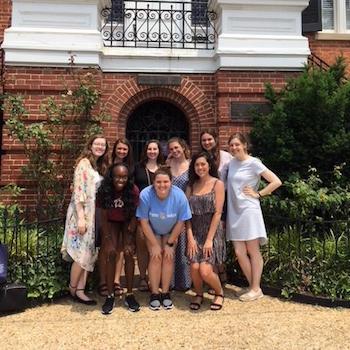
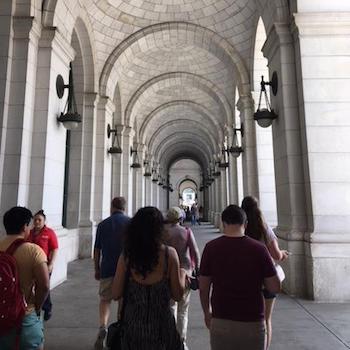
(Kinder Scholars Taking in the City)
KICD: Have you found a spot/seen a site/had a meal/visited a neighborhood/gone to an event that you’re particularly excited about? Has anything made your to-do list?
RW: As part of my internship, I am allowed to go to events around the city that could help with my research project. I had the privilege of attending a conference co-hosted by WCAPS and the Hudson Institute that addressed the importance of diversity in the field of nuclear nonproliferation policy. I particularly liked this event because it featured panelists from multiple educational backgrounds—from nuclear engineering to international relations. I am very excited to be able to attend other events like this that are relevant to my interests and career goals, and I definitely want to make sure to go to the Holocaust Museum before I leave D.C.
JS: As I have already stated, the CIA was absolutely amazing, and another fun place has been Chinatown. My to-do list so far includes seeing all the monuments, attending an embassy reception, and eating brunch at LiLLiES (Dr. Conklin told us it was fantastic). I’m also extremely excited for all of the field trips, especially Annapolis, which falls on my birthday!
ME: Let me start by saying that D.C. is my city! I’m not sure if I have my favorite place yet, because each week I am finding a new spot to fall in love with. The coffee shops are fantastic and the buildings are beautiful. If I had to choose one spot that makes me feel most at home, it would be The Wharf district, because I just love the harbor. There are places to kayak and paddleboard and the restaurants are absolutely amazing. I have tried delicious fresh fish and homemade ice cream—highly recommended! And I have gotten to the point where I really feel like a resident of D.C. In the last week or so, I have solidified my knowledge of the Metro and feel like I can get anywhere without a map!
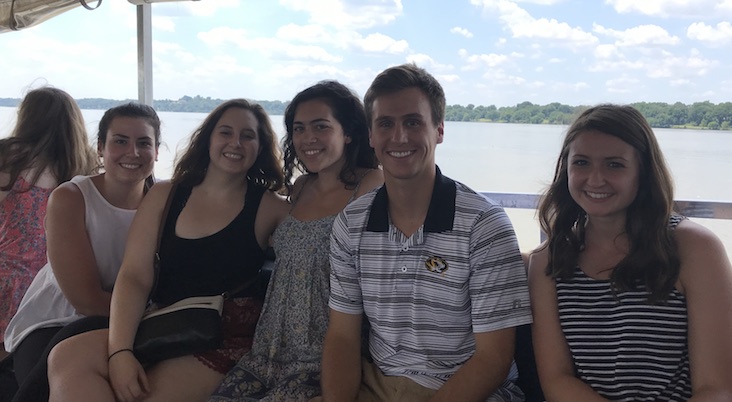
(Crossing the Potomac)
AJ: Moving to D.C. for the summer from Columbia, Missouri, has definitely been a change of pace. Taking the Metro to work every morning and being a local commuter is a really neat experience that is unlike any I have had as a college student at Mizzou. I am especially excited to embark on our first Kinder Scholars trip tomorrow (we are going to the CIA!) and to continue experiencing the changing history of our nation’s capital.
SJ: In typical D.C. fashion, I am absolutely enamored with the National Mall. The endless variety of monuments, museums, and events available to the public never ceases to amaze me. I especially enjoy the National Gallery of Art Sculpture Garden. For most of the week it’s a quiet, shady refuge, free from packs of tourists, but on Fridays it hosts “Jazz in the Garden,” a fun summer concert series. My goal this summer is to visit each Smithsonian museum at least once before I leave.
GH: Myself and a few other Scholars have decided to forgo the vivid brunch culture of the city and instead spend each Sunday lunch at a restaurant from a different ethnicity. We’ve tried Lebanese, Laotian, Chinese, Irish, Ethiopian, Indian, and South African. We can’t get enough of the new spices and styles of eating (though our bank accounts are pretty tired of it). I am particularly stoked about the farmers markets in D.C. as well. I’m eating more fresh fruit and veggies than I ever did back home, and I’ve even gotten all the other Scholars into composting, since the farmers markets collect scraps to decrease waste.
